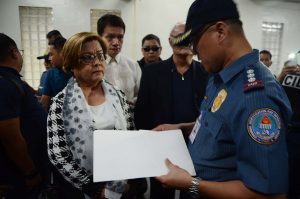On February 24, 2017, Leila de Lima, a sitting senator and former secretary of justice, surrendered herself to the Philippine police. A week earlier, prosecutors had filed drug-related charges against de Lima, alleging her involvement in the trafficking of narcotics within the country’s prison system.
Denied bail, de Lima has spent the four years since fighting the charges in conditions that the rights group Human Rights Watch describes as follows: “In detention, she has been held incommunicado for long periods, not allowed to use electronic devices, faced severe restrictions on visits, and has often been prevented by police escorts from talking to reporters on her way to court hearings.”
The political motivation for de Lima’s arrest was plain and stark. Prior to her arrest, the senator, as chair of the Senate Committee on Justice and Human Rights, had begun a public inquiry into President Rodrigo Duterte’s deadly “war on drugs.” Launched shortly after he took office in June 2016, the war has since claimed untold thousands of victims, most of them impoverished drug users. (Some estimates of the death toll run as high as 12,000).
“We cannot wage the war against drugs with blood,” de Lima told the Senate in August 2016. “We will be trading drug addiction with another more malevolent kind of addiction.”
Specifically, prosecutors allege that de Lima received money from drug dealers inside the country’s prisons at the time she was justice secretary under the administration of President Benigno Aquino III from 2010 to 2015. The charges have been substantiated only by the slipshod testimony of convicted felons, while her legal proceedings have faced significant delays. Over four years, at least six judges have withdrawn from hearing her case.
On the fourth anniversary of her detention, de Lima’s supporters and allies around the world took the opportunity to call for her release, and the dropping of all the charges.
“The fabricated charges against Senator Leila de Lima are not only an outrageous abuse of her basic rights, but also emblematic of the Duterte administration’s oppressive rule,” Phil Robertson, HRW’s deputy Asia director, said in a statement.
De Lima’s history with Duterte goes back much further than his time in Malacañang. In her previous role as chair of the government’s Commission on Human Rights, de Lima spearheaded investigations of summary executions carried out by “death squads” in Davao City, where Duterte was mayor for more than two decades. In August 2016, shortly after coming to power, Duterte vowed to “destroy” an unnamed female government official, widely assumed to be de Lima. He also called her an “immoral woman,” suggested she should hang herself, and threatened to release a sex tape of the senator and her driver. (The video that was later revealed to be fake.)
The treatment of de Lima charts not just the etiolation of the Philippines’ democracy under Duterte, but also the increasingly authoritarian tenor of politics in many Southeast Asian nations. In a report published last year, ASEAN Parliamentarians for Human Rights (APHR), a regional rights organization, identified de Lima as one of at least 27 opposition lawmakers in Thailand, Malaysia, and the Philippines who have been investigated or charged for carrying out their parliamentary mandate.
The report documented how these attacks have often involving the use (or abuse) of the region’s legal systems. According to APHR, the choice methods include filing politically motivated cases against outspoken opposition members of parliament, stripping them of their seats, threatening or surveilling them, or (in the case of female MPs), organizing campaigns of sexist vilification against them. It concluded that “governments in the region have been targeting opposition lawmakers as part of their broader attempts to suppress dissent and attain unchecked power.”
Last week, a Muntinlupa City court acquitted de Lima of one of the three charges against her, which alleged her involvement in a conspiracy to promote the drug trade within the New Bilibid Prison. But two others remain outstanding, and the outspoken senator seems set to remain in prison until the end of Duterte’s presidential term next year.

































